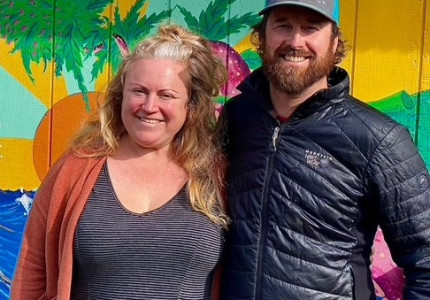Jonah Ward hikes up a rise to a stunning hilltop overlooking Foster Mountain, east of Willits. It’s not hard to imagine Jonah and his siblings running up this same hill as children, a few decades earlier. Lazy Moon Ranch is Jonah’s family home.
“My parents were Deadheads and hippies from New York and Massachusetts. They came to California separately, met out here and bought our property in the ‘70’s,” says Jonah.
Back then, there was a community association at the base of Foster Mountain. “Dad was staying with people nearby. Parcels were being subdivided, and he heard about this 160-acre parcel. He and his friend, Jim West, bought it for $35,000.”
“I remember seeing a note about land for sale in Willits on the back of a bathroom door,” Michael Ward laughs. The first year I was here, it rained about 75 inches! During heavy rains, we’d have to drive backwards to make it up our hill. That was my introduction. Living here was like coming into my manhood- figuring out what I was doing with my life.”
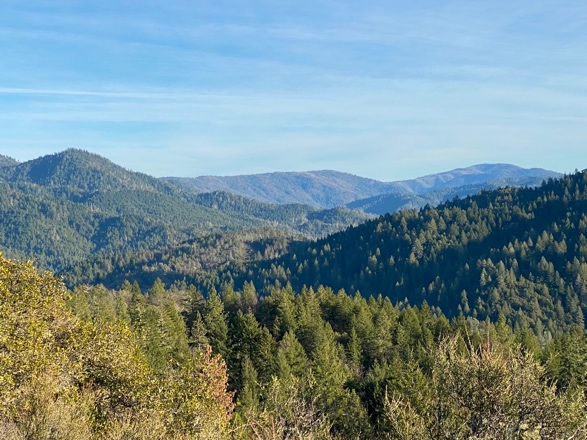 “First, my wife Patricia and I lived in a teepee. Particle board was really big in the ‘70’s,” smiles Michael. “It cost $1.75 for any size you wanted, so after the teepee, I built our first house: a 12 x 25 room,” says Michael.
“First, my wife Patricia and I lived in a teepee. Particle board was really big in the ‘70’s,” smiles Michael. “It cost $1.75 for any size you wanted, so after the teepee, I built our first house: a 12 x 25 room,” says Michael.
“No one lives past us. We have one neighbor. The Eddie Family owns the rest of the mountain, which is protected by a conservation easement,” says Jonah. Foster Mountain was one of the first associations in the county. Jonah was born in the family’s two-story house, constructed with huge beams reclaimed from a San Francisco pier. Early on, the Wests occasionally stayed on the land, and the families forged long-lasting friendships and memories.
Patricia and Michael’s son was diagnosed with leukemia at the age of 6. Friends came to their aid, helping to complete the family home.
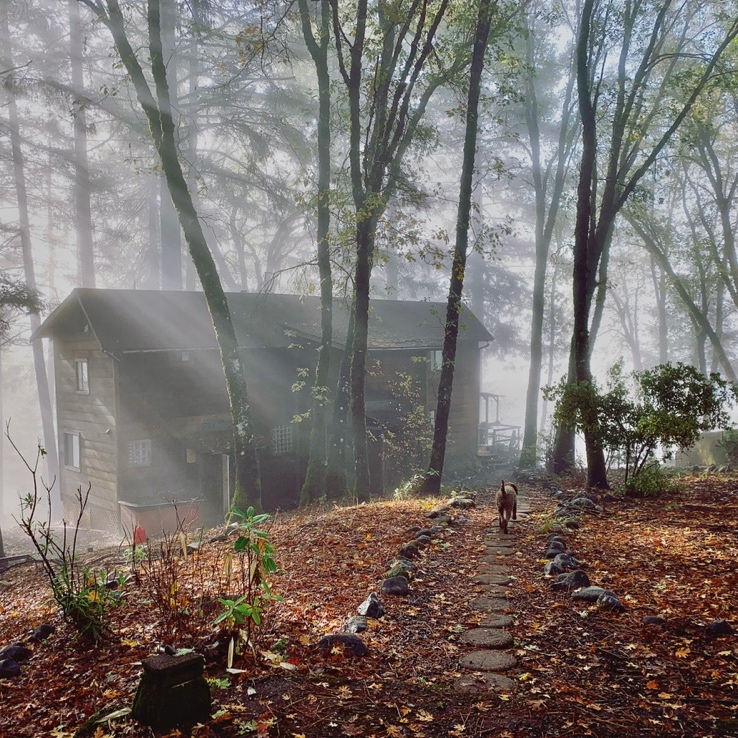 “Our friends helped build the two stories off that particle board cabin. We built the foundation, bedroom and kitchen during a terrible winter with three feet of snow. The Willits High nighttime woodworking class made our kitchen cabinets, and we finally used all those pier beams,” says Michael.
“Our friends helped build the two stories off that particle board cabin. We built the foundation, bedroom and kitchen during a terrible winter with three feet of snow. The Willits High nighttime woodworking class made our kitchen cabinets, and we finally used all those pier beams,” says Michael.
Robert and Eliza Scott were the property’s original homesteaders, moving to Willits from Kansas in 1881. They are buried on the land. “The Scotts grew apples known as ‘Seek No Further,’” Jonah explains. Though little remains of their homestead, a written history of the property details the apples and the people who tended them. “The apples were sold countywide. We still have some of the original trees and still encounter people with grafts from them.”
Michael was a pile driver. “From the Bay Area to Crescent City, anything constructed over or near water probably involved my dad,” says Jonah. Michael worked on nearly every Bay Area bridge retrofit following the 1989 earthquake.
 Jonah and his siblings attended the Emandal Vineyard School where his mother, Patricia completed her student teaching. She became a full-time teacher for 17 years. Jonah graduated from Willits High School in 2002, receiving his BFA from the California College of Arts and Crafts in 2006. Willits art instructor Kathleen Kirkpatrick was Jonah’s mentor, encouraging him to paint and draw. “Then I discovered glass. I visited the Waterford Crystal Factory in Ireland and realized, ‘This is it.’”
Jonah and his siblings attended the Emandal Vineyard School where his mother, Patricia completed her student teaching. She became a full-time teacher for 17 years. Jonah graduated from Willits High School in 2002, receiving his BFA from the California College of Arts and Crafts in 2006. Willits art instructor Kathleen Kirkpatrick was Jonah’s mentor, encouraging him to paint and draw. “Then I discovered glass. I visited the Waterford Crystal Factory in Ireland and realized, ‘This is it.’”
onah’s  artwork reflects the Mendocino wildlands. Using glass, wood, fire and natural materials, he “facilitates” interactions between the elements, creating glass-burnt panels that communicate energetic exchanges between fire, molten glass and wood. He creates “paintings” using Madrone tree bark and paper from Bald Faced hornet nests. The textural, abstract canvasses honor and express his connectedness to nature.
artwork reflects the Mendocino wildlands. Using glass, wood, fire and natural materials, he “facilitates” interactions between the elements, creating glass-burnt panels that communicate energetic exchanges between fire, molten glass and wood. He creates “paintings” using Madrone tree bark and paper from Bald Faced hornet nests. The textural, abstract canvasses honor and express his connectedness to nature.
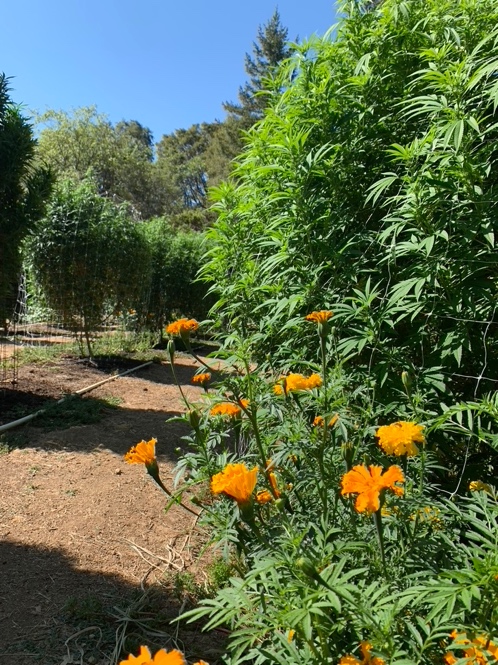 Tragically, a 2007 fire on the land resulted in Jim West’s death. Jim’s two daughters inherited his share of the property. Today, Jonah, Michael, and Jim’s son-in-law Josh Mastel are united as long-time friends, land stewards and co-owners of Lazy Moon Ranch.
Tragically, a 2007 fire on the land resulted in Jim West’s death. Jim’s two daughters inherited his share of the property. Today, Jonah, Michael, and Jim’s son-in-law Josh Mastel are united as long-time friends, land stewards and co-owners of Lazy Moon Ranch.
Michael started growing in 1979.
“Foster Mountain was a big part of the early cannabis scene,” says Michael. “We went from water buckets to drip irrigation to high lifters to off-beat doctors giving you cannabis recommendations,” he smiles. “I started growing cannabis in pails. Water was plentiful. I would take a gas pump, start my engine, run a hose with buckets and water 25 plants hidden in the manzanita.”

“I don’t think I ever grew any more than 20 pounds. You could make money with that. A guy in the Association was called, ‘The Don.’ He had connections in Amsterdam, so we’d get seeds from him. We’d cross AK 47 with something a little l ighter. Grow bags, irrigation, being on the cutting edge of solar- we went through all of that,” says Michael.
The family experienced the trauma of early cannabis raids. In a bust broadcast by CBS News, then-California Attorney General George Deukmejian led a raid on Foster Mountain, arresting an elderly grandmother. COMMET marijuana eradication teams used the region for training exercises. During raids, properties were ravaged. Homeowners endured long-term anxiety from frequent helicopter flyovers. “Guys on horseback with pistols busted people in the hills for years,” says Jonah.
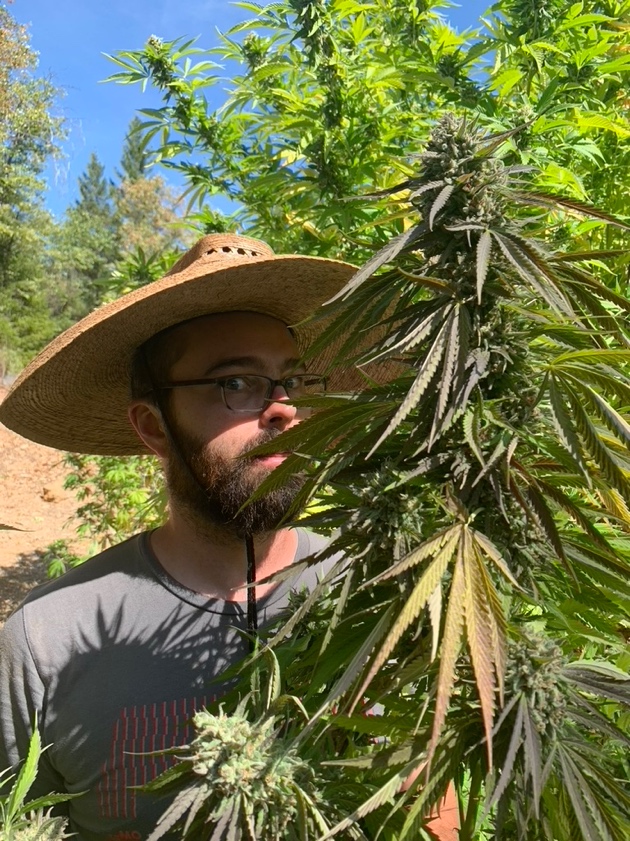 “Back then, when you got busted, you really got busted. They’d mess your place up, take your land. They took our crop once, just before we started 215 farming. We legalized from then on,” says Michael.
“Back then, when you got busted, you really got busted. They’d mess your place up, take your land. They took our crop once, just before we started 215 farming. We legalized from then on,” says Michael.
“Our scariest year was the first year we grew a legal, medical crop. It was very difficult to trust the system,” Jonah notes.
The families still decry the presence of illegal operators.
“Here we are, paying enormous taxes, barely surviving, while others do whatever the hell they want. Josh even took drone photos of illegal ‘gardens’ to the county, including GPS coordinates. They want us to do the eradication work for them,” says Jonah.
“After my parents moved, we kept growing 25 plants. As Prop 64 neared, we got an early start with permitting. We’re in Rangeland. If we ever suspended our permit, we’d never get it back.”
Along with cannabis, the orchards and a gargantuan fig tree planted by the Scotts, the partners are growing truffles.
“We planted an acre-and-a-half of truffles five years ago, which reunited our two families,” says Jonah.
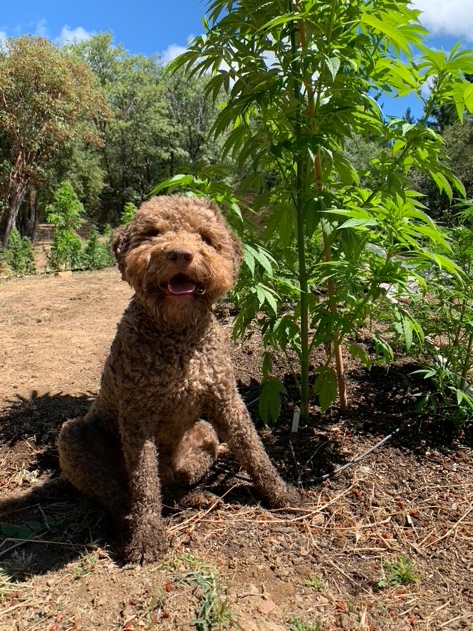 They planted oak and hazelnut trees, which have a symbiotic relationship with truffles. “The trees are inoculated with truffle mycelium, which cover the tree’s root tips, creating an exchange of nutrients. Mycelia breaks down fine materials in the soil, giving it to the trees, which give back through photosynthesis.”
They planted oak and hazelnut trees, which have a symbiotic relationship with truffles. “The trees are inoculated with truffle mycelium, which cover the tree’s root tips, creating an exchange of nutrients. Mycelia breaks down fine materials in the soil, giving it to the trees, which give back through photosynthesis.”
The lovable star of the project is Elio, a purebred Lagotto Romagnolo- an Italian dog bred for truffle hunting. “Elio’s trained, and he’s found truffles in other orchards.” Jonah places a few drops of truffle oil on a napkin. The sound of a clicker alerts Elio to hunt. In seconds, he gently places his paw on the “truffle,” garnering a chicken reward.
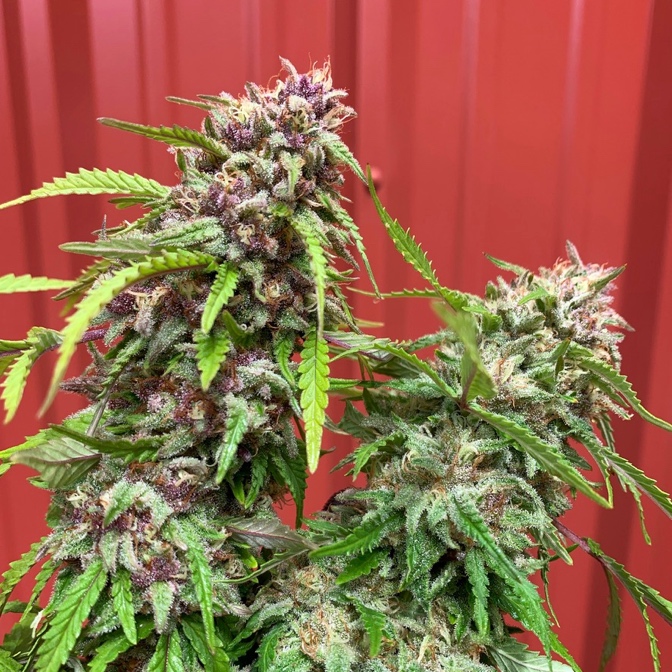 Truffles become harvest-ready between 5 and 10 years after planting. Jonah has a client base of chefs that he provides with foraged mushrooms. Depending on the season, it’s possible to earn $200 for 80 grams of truffles.
Truffles become harvest-ready between 5 and 10 years after planting. Jonah has a client base of chefs that he provides with foraged mushrooms. Depending on the season, it’s possible to earn $200 for 80 grams of truffles.
The families are revitalizing the apple orchard. Josh shares, “My dad is a Master Gardener. He and my uncles grew up on family farms. They’ve visited to help with the cannabis harvest and took the orchard project as their own. Last fall’s 600-pound apple harvest was a result of their efforts.”
“And I’ve got 25 gallons of hard cider brewing right now,” Jonah smiles.
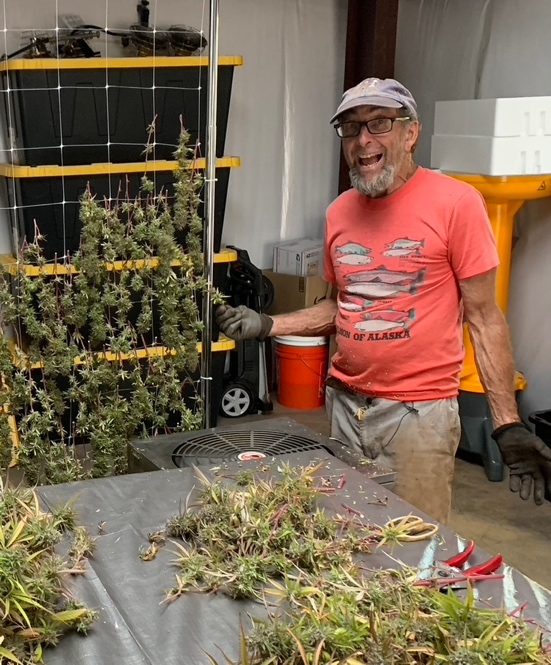 When it comes to complying with cannabis regulations, Jonah and Josh have three words: “It’s been hard.”
When it comes to complying with cannabis regulations, Jonah and Josh have three words: “It’s been hard.”
“We’ve each played a role with compliance. We did all the licensing and application work, except for the CEQA portion,” says Jonah.
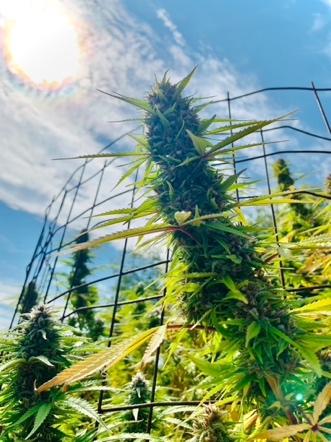 “Jonah’s my Godsend,” says Michael. “Having Josh on board getting the business flowing has been great. During the Back to the Land movement, I learned right away I had to rely on myself to figure out everything that came with that lifestyle. You became a carpenter, auto and generator mechanic, electrician, off-grid installer and farmer. This carried over to my kids, who are can-do people in all these areas.”
“Jonah’s my Godsend,” says Michael. “Having Josh on board getting the business flowing has been great. During the Back to the Land movement, I learned right away I had to rely on myself to figure out everything that came with that lifestyle. You became a carpenter, auto and generator mechanic, electrician, off-grid installer and farmer. This carried over to my kids, who are can-do people in all these areas.”
“Dad and Josh visit during site prep and harvest, doing whatever needs to be done. Dad is 75 and
l Michael Ward enjoying the harvest oves this place as much as I do. Our goal is to continue to diversify and create a place for visitors to experience what we’ve been lucky to have- to keep the dream alive. We’re hanging on.”
Lazy Moon Cannabis entered Blueberry Muffin in the Kure Mendocino Invitational. Their CBD flower, purchased by Chemistry, won 3rd Place in the tincture category at the 2020 Emerald Cup. Visit Lazy Moon cannabis on Instagram and https://www.lazymooncannabis.com. Jonah’s artwork can be viewed at http://www.jonahward.com.


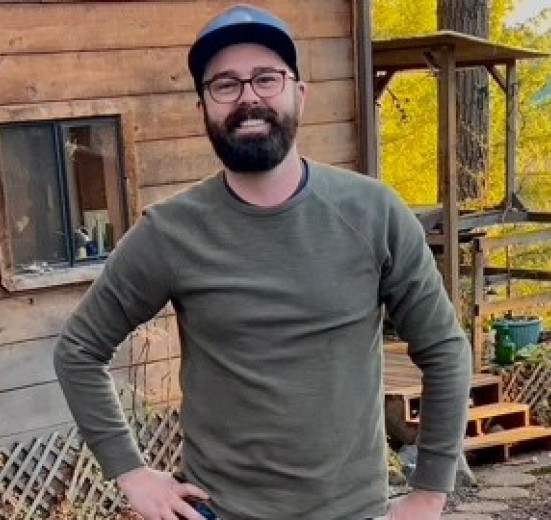

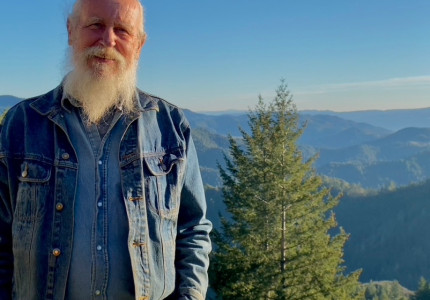
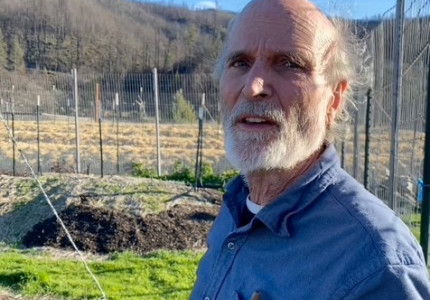
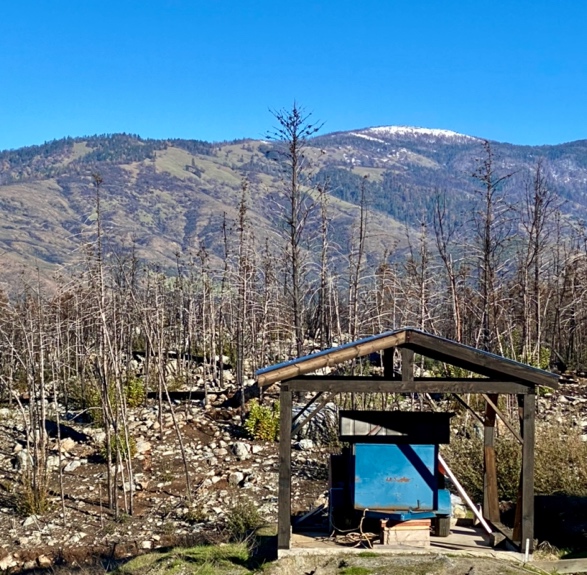 “I’ve only quit smoking three times since 1964,” he smiles.
“I’ve only quit smoking three times since 1964,” he smiles.